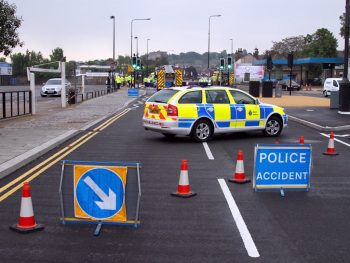DfT launches consultation on Road Collision Investigation Branch
A new investigation branch dedicated to preventing future road collisions, including from self-driving and electric cars, could be established under government plans.

An RCIB would carry out thematic investigations and probe specific incidents of concern to establish the causes of collisions and make independent safety recommendations
After years of lobbying from road safety campaigners, the Department for Transport (DfT) has launched a consultation on proposals to set up a Road Collision Investigation Branch (RCIB).
It would operate much like the similar independent bodies that already exist for air, maritime and rail accidents and would thematically investigate road accidents and probe specific incidents of concern.
This would then establish the causes of collisions and make independent safety recommendations to help further improve road safety across the country.
The DfT said the consultation was prompted by huge developments which are taking place across the transport sector, such as the roll-out of increasingly automated and electric vehicles.
Roads Minister Baroness Vere said: “The UK’s roads are among the safest in the world, but we’re always looking at ways to make them even safer.
“A new investigation branch would play a huge role in this work by identifying the underlying causes of road traffic collisions, so we can take action to prevent them from happening again.
“It would also provide us with vital insight as we continue to modernise our road network to ensure better, greener and safer journeys.”
Currently information about the perceived causes of road crashes is recorded by police at the time of collisions, for criminal prosecution purposes and to inform statistics collated and published by the Department for Transport.
But the establishment of an RCIB has long been called for; the Parliamentary Advisory Council for Transport Safety (PACTS) said in 2016 that the UK should follow the lead of other countries, including the US and Sweden, as it warned that self-driving cars and increasing degrees of automation in current models were creating new challenges and opportunities for collision investigators.
Speaking at the time, PACTS said: “The UK carries out some excellent collision investigation but it is fragmented and inconsistent. We need to learn from air and rail, harness the new technical opportunities, and bring together the efforts of researchers, police, coroners, local authorities and others more effectively.”
According to PACTs, a single coordination investigation framework could drive down the number of collisions on our roads.
While the number of road fatalities in Great Britain fell in 2020 due to lockdowns, road accident reductions have largely plateaued since 2010.
The RAC Foundation, which has also been pressing the need for a road investigation branch, welcomed the new consultation. Director Steve Gooding said: “After excellent progress across many years, sustained road safety improvement has been hard to achieve over the past decade, both in the UK and further afield.
“We should be challenging ourselves on whether we are understanding all we can about the causes of road collisions and what could be done to prevent them – our research to date suggests that more could be learnt – which is why today’s consultation is so important and so welcome.”
Brake has also said that current methods are “simply are not adequate to properly investigate and determine the most effective countermeasures to tackle future road casualties”.
Commenting on today’s announcement, Jason Wakeford, head of campaigns, said: “Brake has long advocated for an independent agency to provide the necessary evidence to learn from crashes and so we applaud the Department for Transport for launching today’s consultation.”
The consultation, published on the gov.uk website, will run until 9 December 2021.












